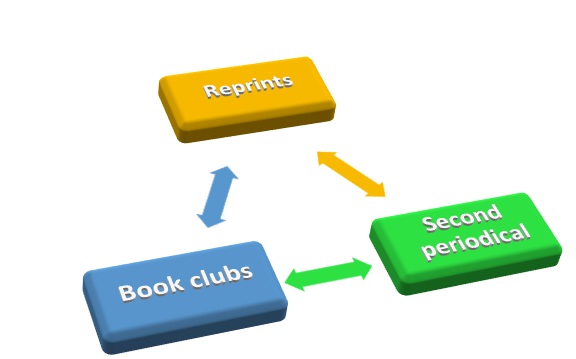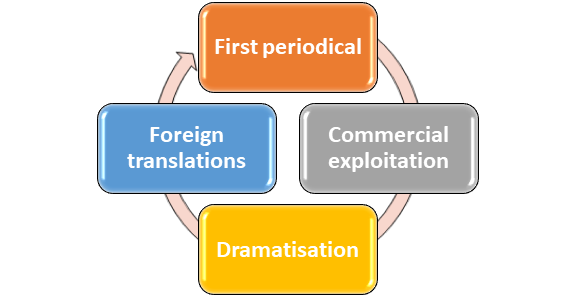Subsidiary Rights
Updated on 2023-08-29T11:58:29.312897Z
Subsidiary Rights
What are subsidiary rights?
Subsidiary rights relate to terms in licencing agreements that allow licenced publishers to develop or publish copyrighted media in derivative formats.
Digital rights management (DRM) applies subsidiary rights to electronic books, book derivatives, and publishers often manage electronic publishing. Whenever a book is released, the publisher and the author sign a subsidiary rights agreement.
Specifications for foreign, audio, electronic, or software media are included in subsidiary rights language. Subsidiary rights also refer to how a publisher uses copyrighted material, such as redistribution or third-party negotiating.
Highlights
- Subsidiary rights are provisions in licencing agreements that allow licenced publishers to create and publish copyrighted media in derivative formats.
- In digital rights management, subsidiary rights apply to electronic books.
- Primary and secondary subsidiary rights are the two types of subsidiary rights.
Frequently Asked Questions (FAQs)
What does it mean to have "subsidiary rights", and how does it work?

Source: © Tolberto80 | Megapixl.com
Subsidiary rights allow your publisher to licence different adaptations or editions of your content to many other firms. According to the terms of their contracts, authors are paid a share of the revenue generated by the exploiting subsidiary rights.
A typical contract, for example, says that the publisher has sole right to release a novel to book clubs. In exchange for establishing the book club, the author receives half of the proceeds, and the publisher receives half of the proceeds.
Simply put, when you sign an agreement with a publisher to have your book published, you are giving the publisher approval to create, print, and distribute the physical book.
Every other version of the book is optional, and it can be licenced to another party. Others can be given the right to make a foreign-language edition, an audiobook, or a book club edition of the work. Moreover, an extract may appear in a magazine. All these partnerships are possible, and subsidiary rights are a method for the publisher to make money in addition to the actual book sales.
However, selling subsidiary rights is usually an excellent method to increase your book's exposure. Publishers usually take all the risks upfront and pay you, but they don't know if they'll earn a profit until they see how the book fares in the market. They have a greater chance of success if they can licence the rights to a book.
Every bit of extra exposure for your book is a significant plus, and subsidiary rights are a great way to get that attention. It benefits not only the financial line but also the public image. It provides an editor or agent extra talking points when promoting your book.
Salespeople, scouts for movie producers, book club editors, magazine editors, and international editors regularly meet with subsidiary rights directors and agents to discuss what is essential. Having the option to sell your book's rights provides them with an extra push.
What are the various categories of subsidiary rights?
Subsidiary rights are divided into two categories: "primary" and "secondary." Publishers retain all primary subsidiary rights in general. Secondary rights are less guaranteed; the publisher may reserve them, the author may retain them, or the publisher may share them.
Primary rights, according to most publishers, include:
Reprints
Reprints are available in a range of sizes and forms. Illustrated editions, large-print editions, deluxe editions, and other special-format copies of a book are examples.
Paperbacks were once considered reproductions of hardcover books; however, most romance publishers now buy both hardcover and paperback rights at the same time, eliminating paperbacks from the category of reprints.
Book clubs
While book clubs have lost favour with the emergence of internet retailers that can deliver specialised content to far-flung customers, many niche publishers still exist.
Usually, significant publishers send manuscripts or early reader copies to book clubs in the hopes of securing a sale. Book clubs then pay some amount for the right to reproduce the material, usually in a larger format with new cover art. While book club rights may not usually pay a lot of money, they bring a lot of reputation and exposure.
Second periodical
Serialisation, digest form, abridgement, condensation, or snippets published in one or more magazine issues are examples of second periodical rights.

Source: Copyright © 2021 Kalkine Media
The following are examples of secondary rights:
First periodical
This periodical publication occurs before the publication of a book. A novel may be serialised in its entirety before being sold to a publisher for publication as a book. In such cases, first periodical rights are eliminated from the agreement.
Foreign translations
Specific foreign translations are subject to territorial constraints, such as Portuguese rights for Portugal, distinct from Brazilian rights.
Commercial exploitation
This broad category encompasses a wide range of applications, including video games, toys, and the construction of amusement parks.
Dramatisation
Books could be adapted for the stage, screen, or radio broadcast in various forms, such as a stage play, a feature film, a television series, a musical, a made-for-TV film, or a radio broadcast. Each of these rights can be individually negotiated.

Source: Copyright © 2021 Kalkine Media
What is the payment structure for subsidiary rights?
The subsidiary rights are often charged against the royalty advance paid out to most authors, implying that the author is "earning out" the money that has already been provided to them by the publisher.
The author will only get continued royalties from those rights once the advance has been paid in full. Additional payments from subsidiary rights may never be made if the royalty advance is never paid in full.
It's also worth noting that subsidiary rights are nearly typically provided to the publisher in today's contracts. Some may be negotiable, but for the most part, the industry has standardised this process, and only special rights that aren't included in the typical package may need some negotiation.
Subsidiary rights in publishing are a simple way for anyone to profit from their work. Even if the terminology is deemed "standard" by everyone involved, make sure the bargain you get is fair.